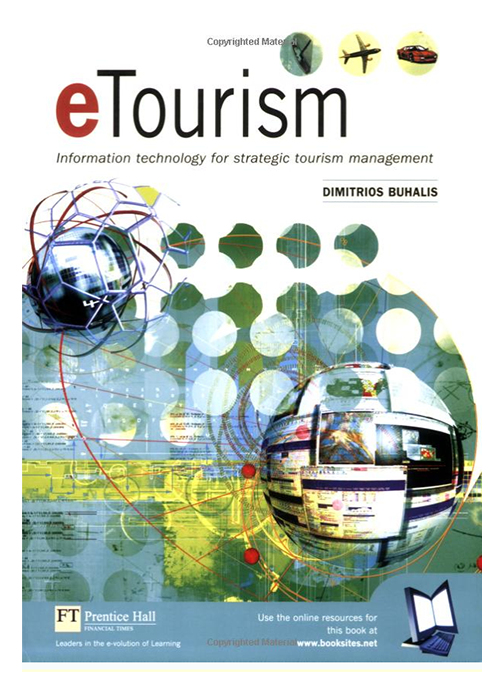
eTourism
Buhalis, D., 2003,eTourism: information technology for strategic tourism management,Pearson (Financial Times/Prentice Hall), London ISBN 0582357403.
The book is aimed at advanced undergraduate and postgraduate students in business, tourism and hospitality programmes that need to explore how they can use ICTs in a strategic context. It is also anticipated that researchers and practitioners will find it useful and stimulating. This book addresses the digitization of all processes and value chains in the tourism, travel, hospitality and catering industries. By analysing the new technological trends it provides a solid basis for analysing the impacts of the Information Communication Technology (ICT) revolution on the tourism industry. The book adopts a strategic management and marketing perspective for tourism enterprises and destinations. It suggests that eTourism revolutionizes all business processes, the entire value chain as well as the strategic relationships of tourism organizations with all their stakeholders. It additionally focuses on how ICTs are employed in airlines, hotels, travel agencies, tour operators and destinations management organizations. The book demonstrates that eTourism increasingly determines the competitiveness of the organization, and therefore, it is critical for the competitiveness of the industry in the longer term.
Features
Strategic perspective demonstrates the contribution of ICTs to tourism organizations’ competitiveness
A wealth of international examples ensure global application and relevance
Extensive use of case studies and illustrative examples demonstrate the link between theory and real world tourism situations
Further discussion topics encourage students to analyse further the information covered
Extensive bibliography and further reading encourage further study
Associated website featuring up-to-date FT articles and power point slides create a comprehensive teaching and learning package.
Table of Contents
List of figures, tables and case studies
Foreword
Acknowledgements
About the author
Preface
The information and communication technologies revolution and strategic management: issues – challenges – trends
1 Information and communication technologies: evolution and revolution
2 Implications of the ICT revolution for business and strategy
3 eTourism: the dynamic interaction of ICTs and tourism
4 Demand-driven eTourism
5 Supply-driven eTourism
6 Operational management and distribution in eTourism
7 eAirlines
8 eHospitality
9 eTour operators
10 eTravel agencies
11 eDestinations
12 eTourism: synthesis and a vision of the future
Back Cover
This book addresses the digitization of all processes and value chains in the tourism, travel, hospitality and catering industries. By exploring the new technological trends it provides a solid basis for analysing the impacts of the Information Communication Technology (ICT) revolution on the tourism industry. The book adopts a strategic management and marketing perspective for tourism enterprises and destinations. It suggests that ETourism revolutionizes all business processes, the entire value chain as well as the strategic relationships of tourism organizations with all their stakeholders. It additionally focuses on how ICTs are employed in airlines, hotels, travel agencies, tour operators and destinations management organizations. The book demonstrates that tourism ICTs increasingly determine the competitiveness of the organization, and therefore, they are critical for the competitiveness of the industry in the longer term.
The book is aimed at advanced undergraduate and postgraduate students in business, tourism and hospitality programmes that need to explore how they can use ICTs in a strategic context. It is also anticipated that researchers and practitioners will find it useful and stimulating.
Features and benefits:
- Strategic perspective demonstrates the contribution of ICTs to the competitiveness of tourism organizations and destinations
- A wealth of international examples ensure global application and relevance
- Extensive use of case studies and illustrative examples demonstrate the link between theory and real world tourism situations
- Discussion topics encourage students to analyse further the information covered
- Extensive bibliography and further reading encourage more advanced study
- Associated website featuring up-to-date FT articles and power point slides create a comprehensive teaching and learning package.